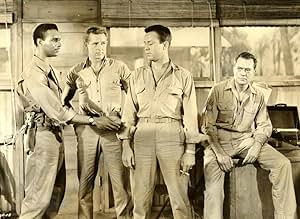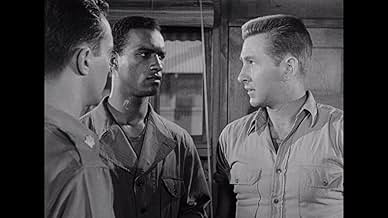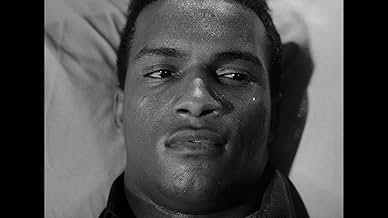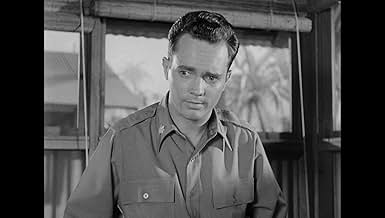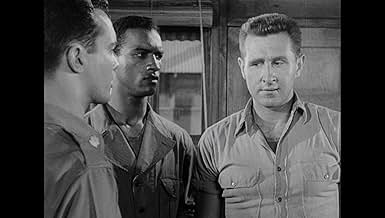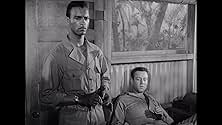During WW2, a reconnaissance platoon is sent to map out a Japanese-held island but racial tensions arise between the white soldiers and the only black member of the group.During WW2, a reconnaissance platoon is sent to map out a Japanese-held island but racial tensions arise between the white soldiers and the only black member of the group.During WW2, a reconnaissance platoon is sent to map out a Japanese-held island but racial tensions arise between the white soldiers and the only black member of the group.
- Awards
- 3 wins & 2 nominations total
- Director
- Writers
- All cast & crew
- Production, box office & more at IMDbPro
Featured reviews
The years 1949, 50, & 51, witnessed a spate of social conscience movies before the McCarthyite-HUAC purges put an end to them. Unfortunately, this is one of the more obscure. So far as I know, the movie's rarely been revived-- in fact, I had to order a DVD decades after first viewing. Still, the film's many moments of sheer rawness have stayed with me over time.
In my book, the 90-minutes is not a complete success. I still have trouble with the psychiatrist's (Corey) facile analysis of Moss's (Edwards) problem following island combat. It's much too pat and self-assured to be convincing, more like a happy ending contrivance. Yet this Hollywood moment is more than offset by the racially charged atmosphere of the remainder. Note, for example, how the three men react to Moss on his first arrival, which sets the racial stage for what follows. Finch (Bridges) embraces his old friend; Mingo (Lovejoy) is understandably dubious; while racist TJ (Brodie) snubs the black man. Given Mingo's doubts, (understandable, given the intimate nature of the mission that now includes a racial outsider), it's really his ambivalence on which the plot pivots. Lovejoy's low-key performance makes Mingo easy to overlook. Yet, it's really Mingo's trajectory that delivers the movie's ultimate message. I'm with those who think Lovejoy steals the movie in his own mild way.
But get a load of that jungle. It's creepy enough to suck the air out of a dirigible. Anyone like Finch who goes into that maw shouldn't expect to come out. At this point in his career Bridges was one of the most interesting actors around. Always virile and athletic, he's a nice guy here. Yet, catch him in the noir classic The Sound of Fury (1950). There he's egotistical and mean-spirited in totally convincing fashion. Too bad the bulk of his later career, following communist allegations, was spent within the confines of serial TV.
Of course, the movie's mainly remembered for James Edwards' role as a young dignified black man. I think we'd have to go back to Paul Robeson in the 1930's to find a similar black-man persona. Unfortunately, African-Americans were consigned to buffoonish or menial roles during the period. But here, Edwards presents a movie star appearance in a difficult role. His Peter Moss is proud and dignified one moment, yet confused and vulnerable the next. All of which befits an educated outsider in uncertain surroundings. Clearly, there's a laudable effort to deal with the effects racism has on a victim's internal dynamics. Thus, the narrative was an unusual Hollywood attempt at racial honesty, but one that was unfortunately cut short-- after all, the US couldn't fight a cold war by airing its dirty linen to the world. Anyway, thanks reviewer CeOTIS for filling in some facts about Edwards. Clearly, he was suited for Poitier or Belafonte type roles, but I guess his associations with lefties consigned him to the fringes. A genuine loss.
The movie itself manages to rivet interest despite its stage origins. The few sets are confining. Still that has the effect of concentrating the drama. Plus, the fact that we never see the enemy lends an even more unsettling atmosphere. The sudden use of the epithet 'nigger' is jolting to contemporary ears. And especially so, when the easy-going Finch under pressure begins to mouth the word. Then we get an idea of how embedded skin color is in the general culture. Seems to me, however, some latitude should be granted to the lack of combat realism that other reviewers use to criticize. After all, the movie's not really a war movie. Instead, it's a social conscience film using wartime conditions to illuminate conditions at home. Note, however, that the script lays the blame for race prejudice on the individual, that is, unless I missed something. That way more explosive topics like politics or the economy are finessed.
Anyway, viewers who appreciate this film should catch up with other racial films of that pregnant period. Let me recommend—Intruder in the Dust (1950); Lost Boundaries (1949); The Well (1951); No Way Out (1950); and Pinky (1949). Despite isolated exceptions, like The Defiant Ones (1958), movies would have to wait another 20-years before the issues would again be taken up in sustained fashion. Nonetheless, the human drama here has lost little of its power over the intervening decades. A tribute, I think, to all those involved.
The irony is Mr. Edwards' last film, PATTON, has him portraying a valet. The insult is that Patton's most important victory - The Battle of The Bulge - was facilitated in great part by the contribution of The Big Red One - a battalion of Black truck drivers - who risked all to keep Patton's front supplied until the weather cleared enough to allow cargo flights. This historic fact (the race of the drivers in this segregated unit) is ignored in the film leaving Mr. Edwards with the only Black speaking part in a sweeping biography about a WWII general - isn't this where we came in?
If you examine Mr. Edward's filmography (by which I mean screen the films) it is difficult to understand the spottiness of his career and his relative obscurity. Part of the explanation may lie in the murky machinations of HUAC, McCarthyism, the Hollywood Blacklist and Mr. Edwards' worldwide tour with this film (it included a stop in the then Soviet Union). If you have any information regarding this aspect of his life please post it here.
CeOTIS
Did you know
- TriviaThis was the first Hollywood movie to be officially be permitted to use the word "nigger" after The Emperor Jones (1933). Previously, the Hays Code had forbidden it since 1934.
- GoofsThe Army Recon Team's helmets are fitted with manufactured camouflaged covers. In W.W.II, these were strictly a Marine Corps- issued item.
- Quotes
Mingo: Yeah, I'll never forget the first letter I got from my wife. It started, "My darling, darling, darling, I'll never again use the word 'love' without thinking only of you." And I remember the last one I got from her. It started, "Dear T.J., this is the hardest letter I've ever had to write."
- Crazy creditsThe initial credits play over actual footage of battles from the Pacific campaign.
- ConnectionsEdited into Dynamite Chicken (1971)
- Soundtracks(Sometimes I Feel Like a) Motherless Child
Traditional
- How long is Home of the Brave?Powered by Alexa
Details
- Release date
- Country of origin
- Language
- Also known as
- La demeure des braves
- Filming locations
- Malibu, California, USA(navy PT boat scene)
- Production companies
- See more company credits at IMDbPro
Box office
- Budget
- $375,000 (estimated)
- Runtime1 hour 28 minutes
- Color
- Aspect ratio
- 1.37 : 1
Contribute to this page


